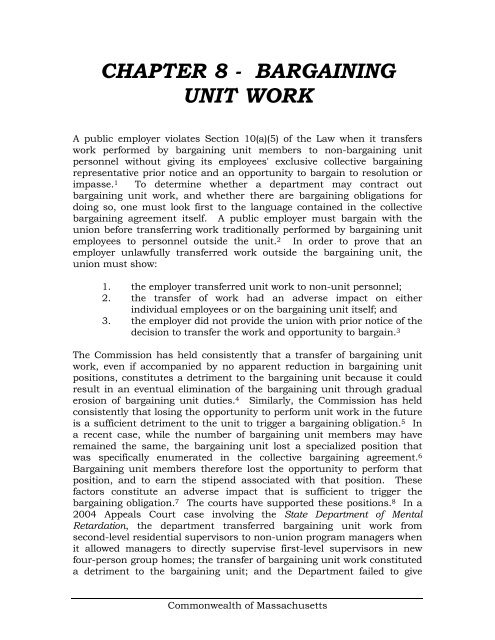Management Rights - AELE's Home Page
Management Rights - AELE's Home Page
Management Rights - AELE's Home Page
You also want an ePaper? Increase the reach of your titles
YUMPU automatically turns print PDFs into web optimized ePapers that Google loves.
CHAPTER 8 - BARGAINING<br />
UNIT WORK<br />
A public employer violates Section 10(a)(5) of the Law when it transfers<br />
work performed by bargaining unit members to non-bargaining unit<br />
personnel without giving its employees' exclusive collective bargaining<br />
representative prior notice and an opportunity to bargain to resolution or<br />
impasse. 1 To determine whether a department may contract out<br />
bargaining unit work, and whether there are bargaining obligations for<br />
doing so, one must look first to the language contained in the collective<br />
bargaining agreement itself. A public employer must bargain with the<br />
union before transferring work traditionally performed by bargaining unit<br />
employees to personnel outside the unit. 2 In order to prove that an<br />
employer unlawfully transferred work outside the bargaining unit, the<br />
union must show:<br />
1. the employer transferred unit work to non-unit personnel;<br />
2. the transfer of work had an adverse impact on either<br />
individual employees or on the bargaining unit itself; and<br />
3. the employer did not provide the union with prior notice of the<br />
decision to transfer the work and opportunity to bargain. 3<br />
The Commission has held consistently that a transfer of bargaining unit<br />
work, even if accompanied by no apparent reduction in bargaining unit<br />
positions, constitutes a detriment to the bargaining unit because it could<br />
result in an eventual elimination of the bargaining unit through gradual<br />
erosion of bargaining unit duties. 4 Similarly, the Commission has held<br />
consistently that losing the opportunity to perform unit work in the future<br />
is a sufficient detriment to the unit to trigger a bargaining obligation. 5 In<br />
a recent case, while the number of bargaining unit members may have<br />
remained the same, the bargaining unit lost a specialized position that<br />
was specifically enumerated in the collective bargaining agreement. 6<br />
Bargaining unit members therefore lost the opportunity to perform that<br />
position, and to earn the stipend associated with that position. These<br />
factors constitute an adverse impact that is sufficient to trigger the<br />
bargaining obligation. 7 The courts have supported these positions. 8 In a<br />
2004 Appeals Court case involving the State Department of Mental<br />
Retardation, the department transferred bargaining unit work from<br />
second-level residential supervisors to non-union program managers when<br />
it allowed managers to directly supervise first-level supervisors in new<br />
four-person group homes; the transfer of bargaining unit work constituted<br />
a detriment to the bargaining unit; and the Department failed to give<br />
Commonwealth of Massachusetts
















